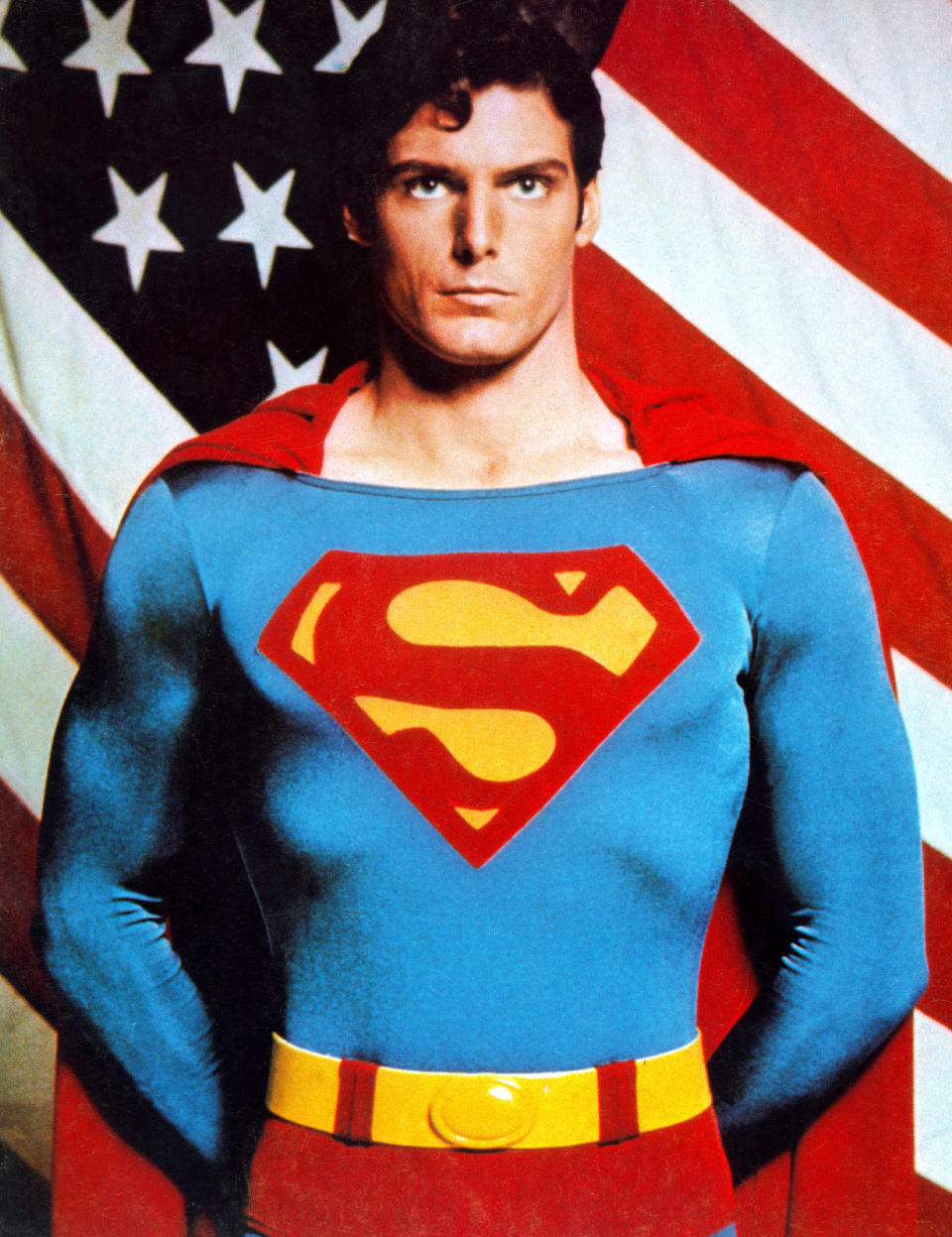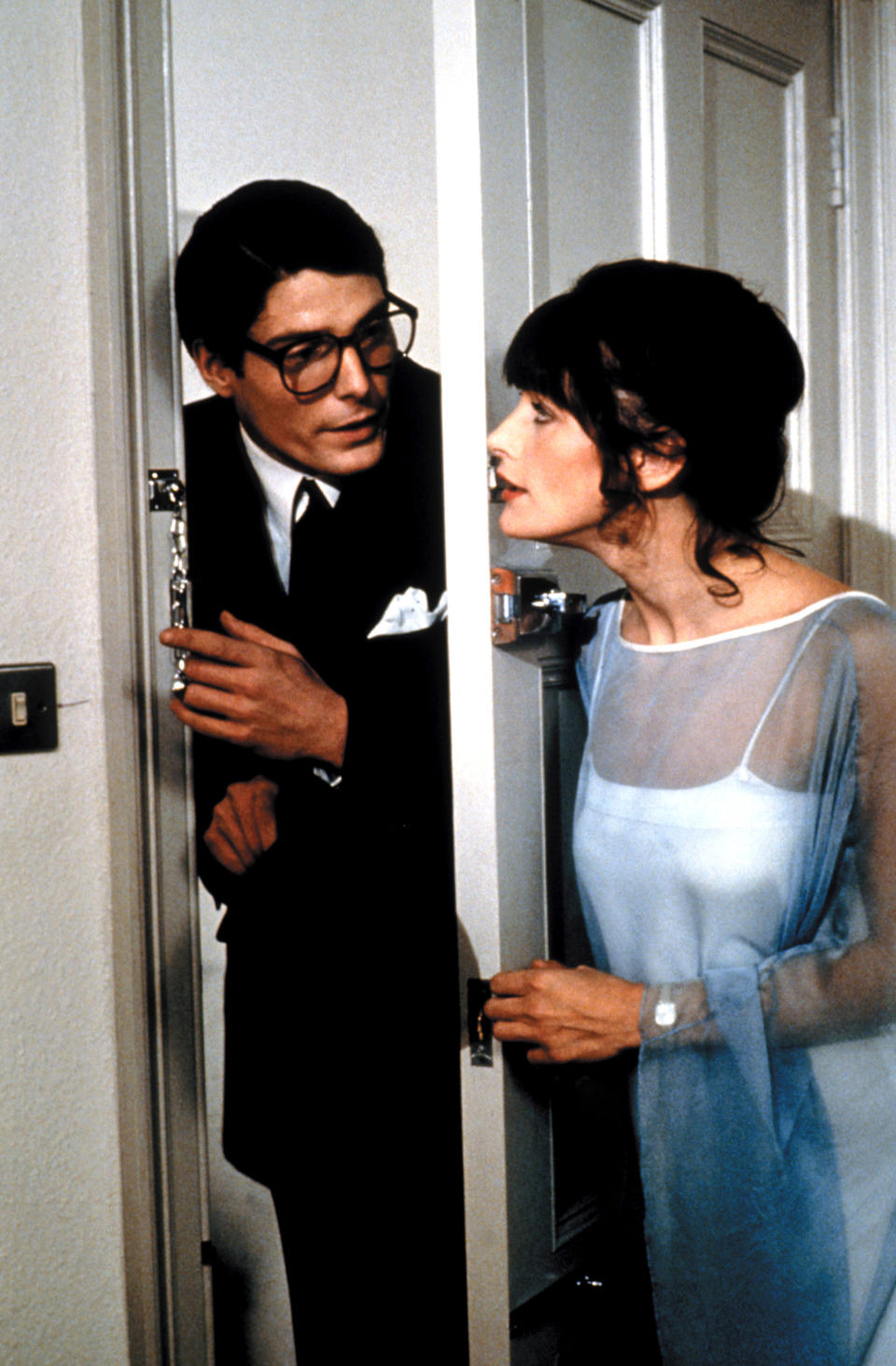'Superman: The Movie' turns 40: Why Christopher Reeve is still the best Man of Steel
By Gwynne Watkins, Yahoo Entertainment
We are living in a golden age of cinematic superheroes. And yet, Hollywood is still struggling to re-imagine the most iconic hero of them all: Superman. Man of Steel star Henry Cavill is reportedly exiting the role after five years. Prior to Cavill’s debut, Brandon Routh played the last son of Krypton in the 2006 film Superman Returns. Though both have their strengths, neither of these interpretations ever achieved the greatness of Christopher Reeve in 1978’s Superman: The Movie and its three sequels. In many respects, these films have aged poorly. But 40 years later (Superman opened on Dec. 15, 1978), Reeve’s interpretation of Superman is still the gold standard, often imitated but never improved upon. Watch the video above (or the extended cut on YouTube) to find out why. Not in a video mood? Read on.
Before we talk about Reeve, let’s quickly look at the Supermen who came before. Vaudeville dancer Kirk Alyn, star of the Superman serials of the late 1940s, played Kal-El like the Golden Age DC character come to life. The first cinematic Superman was a classical hero, a straightforward “good guy” with excellent posture and an infallible sense of right and wrong.
Next came George Reeves, star of both the 1950s Superman TV show and feature film, Superman and the Mole Men. By design, Reeves’s Superman appealed broadly to viewers of all ages, so it’s appropriate that the Army veteran plays the hero like America’s dad: a wise, affable protector, a guy who’s right at home at little Ricky’s birthday party.

Now let’s move forward a generation to 1978, when Superman’s ideals of “truth, justice and the American way” seem corny and old-fashioned. Superman: The Movie leans into that. Rather than trying to make their hero as disillusioned as the rest of post-Watergate America, director Richard Donner and his screenwriters make Superman an optimist, a sincere do-gooder who sees the world with clear eyes yet never loses faith in humankind.
As played by the remarkably talented and slightly good-looking Christopher Reeve, Superman has the abilities of a god and the personality of a nice kid from Smallville. Reeve gives the character vulnerability by playing up his humble Midwestern roots. As Clark Kent, he’s entirely out of place in sophisticated, urban Metropolis, where his wholesomeness strikes people as naive, or a put-on. As Superman, however, his moralising and earnestness become heroic — because nobody doubts that he has something to teach them.
It’s obvious that Clark loves being Superman. He’s been told by the ghost of Marlon Brando that his mission is to serve humanity, and teach them to embrace their “capacity for good.” As perilous as superhero work can be, the look on Reeve’s face when he completes a mission shows that the job is its own reward. He believes that by being kind, he can teach everyone else to be kind — and the idea that someone like Lex Luthor would not want that is unfathomable to him. Moreover, Superman has a sense of humour about all of this. The previous onscreen Supermen knew how to crack jokes, but the films treated their heroic duties with utmost solemnity. Reeve’s playful, self-effacing humour is a quality that’s mentioned in many of the original 1978 reviews, along with the special effects. It seems like a small thing, but this modern touch brought the character firmly into a new era.

Reeve played the Man of Steel from 1978 to 1987, but by film No. 4, the air had gone out of the franchise. After Reeve hung up his cape, Superman TV shows became a thing again (see: Superboy, Lois & Clark, Smallville), but attempts to resurrect the cinematic Superman kept falling apart. The abandoned ’90s version, Superman Lives, was set to star Nicolas Cage, had Kevin Smith among its screenwriters and made it into preproduction with director Tim Burton before Warner Bros. pulled the plug. In the early aughts, J.J. Abrams wrote a script called Superman: Flyby, set to be directed by Brett Ratner with Matt Bomer as frontrunner for the title role. There were budgetary and story reasons why these projects didn’t get off the ground, but they shared an underlying issue: Nobody could agree on what a new Superman should be.
In 2003, director Bryan Singer came up with an answer: He should pretty much just be Christopher Reeve. Superman Returns starred newcomer Brandon Routh, who wore blue contacts to look even more like Reeve than he naturally did. Routh’s performance is not bad at all, but this Superman feels less like a contemporary interpretation than an homage, right down to including verbatim lines from the 1978 film.
A decade later, the DC Extended Universe gave us a true reinterpretation of the big-screen Superman in 2013’s Man of Steel. Henry Cavill’s character is muscular and brooding, a handsome martyr who’s told by the ghost of Russell Crowe that his purpose is to bring hope to the world — and still, he’s really, really conflicted about it. He sees his powers as a punishment and his role as a burden. He wonders if people actually want to be saved. He’s Superman in existential crisis, not unlike Christian Bale’s Batman in the Dark Knight films.

It’s a question of giving audiences the right hero at the right time. Director Christopher Nolan’s Batman, a haunted man fighting to find his purpose without losing his soul, spoke directly to America’s post-9/11 anxiety. By the time Man of Steel came out, we were a nation divided by politics and devastated by recession. While Batman has always been a creature of the night, Superman is a hero whose power comes from sunlight. Director Zack Snyder’s Superman wears the Kryptonian symbol of hope but doesn’t seem that hopeful.
Snyder doubles down on Superman’s despair in the dreary Batman v. Superman: Dawn of Justice, in which Cavill’s Superman declares: “Nothing stays good in this world” shortly before being impaled by Doomsday. Justice League tries to correct these missteps by bringing in some nostalgic Superman tropes. But in a movie where we see Superman asking Batman, “Do you bleed?,” it’s too little too late.
After seeing Cavill’s Superman decimate half of Metropolis to stop Zod from terraforming the world, there’s something really affecting about seeing Reeve’s Superman jump in front of a city bus, rather than let Zod’s henchmen kill its passengers. Watching moments like that one in Richard Lester’s Superman II, Reeve still feels like the hero we need right now, one who cares deeply for all people.

And you can actually see that, not just in his portrayal of Superman, but in his uniquely great, Cary Grant-inspired interpretation of Clark Kent. Reeve doesn’t play Clark like he’s an act or a disguise. Rather, Clark is another side of Kal-El: one who channels the awkwardness he sometimes feels as an alien in the human world, and the joy he experiences from daily life on Earth. The chance to be human, for this Superman, is a privilege.
At the end of the day, Superman needs to be better than us — and not just physically. Reeve’s Superman is the ultimate package, a model of strength and compassion, a patriot who belongs to both red and blue states. He’s funny and sexy, and will always be there to catch your fall. In this post-telephone booth era, he’s still the man of tomorrow.
Watch: Nic Cage finally gets his shot at Superman:
Read more
How to reboot the DC films
Cavill out as Superman?
Cavill not keen on Snyder cut of Justice League

 Yahoo Movies
Yahoo Movies 
